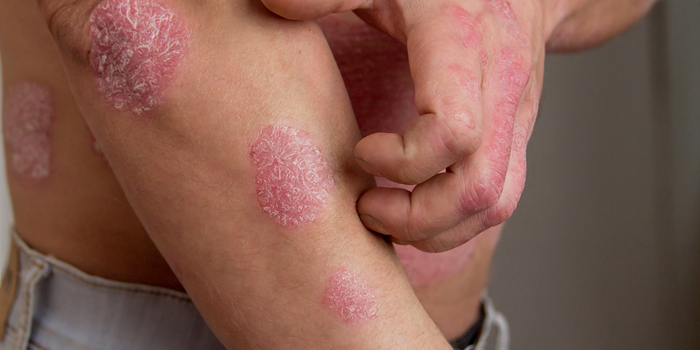Oncology Patient Resources
Cancer.Net is the patient information website of the American Society of Clinical Oncology (ASCO). All patient education content is reviewed and...

Psoriasis is a chronic, but common, recurring autoimmune disease of the skin. Psoriasis is identified by having one or more raised, thick, pink to red, itchy patches that have silvery scales with a distinct border between the patch and normal skin.
The condition tends to go through cycles, flaring for a few weeks or months, then subsiding for a while. The rash can appear anywhere, but is usually found on the scalp, elbows, knees, lower back and genitals, occasionally affecting the fingernails.
In this blog post, we will take a closer look at psoriasis types, symptoms, specialty pharmacy for psoriasis and how to help the condition.
Psoriasis symptoms often start between the ages 15 and 25, but can begin at any age. Men, women, and children of all skin colors can get psoriasis. Psoriasis can itch, burn, or sting, but is not contagious and cannot spread from person to person.
Common triggers in people with a genetic predisposition to psoriasis include infections, cuts, burns, and certain medications.
Common signs and symptoms of the autoimmune disease, psoriasis include:
There are several types of psoriasis, each of which varies in its signs and symptoms:
Plaque psoriasis is the most common type of psoriasis. Plaque psoriasis causes dry, itchy, raised skin patches (plaques) covered with scales. They usually appear on the elbows, knees, lower back and scalp. The psoriasis patches may vary in color, depending on skin tone. The affected skin might heal with temporary changes in color (post inflammatory hyperpigmentation), particularly on darker skin tones.
Psoriasis can also affect fingernails and toenails, causing pitting, abnormal nail growth and discoloration. Psoriatic nails might loosen and separate from the nail bed (onycholysis). More severe versions of the disease may cause the nail to crumble.
Guttate psoriasis primarily affects young adults and children. The disease is usually marked by small, drop-shaped, scaling spots on the trunk, arms or legs. Guttate psoriasis is commonly triggered by a bacterial infection, such as strep throat.
Inverse psoriasis is usually triggered by fungal infections. Inverse psoriasis mainly affects the skin folds of the groin, buttocks and breasts, causing smooth patches of inflamed skin that worsen with friction and sweating.
Pustular psoriasis, a rare type of the disease, causes clearly defined pus-filled blisters. It can occur in widespread patches or on small areas of the palms or soles.
Erythrodermic psoriasis is the least common type of psoriasis. Erythrodermic psoriasis can cover the entire body with a peeling rash that can itch or burn intensely. The rash can either be acute (short-lived) or chronic (long-term).
Although psoriasis is a common, long-term dermatologic autoimmune disorder with no cure, there are treatments available to help manage symptoms. Changing your lifestyle habits and using effective coping strategies can also help those live better with their psoriasis.
Learn more about the Dermatology Specialty Pharmacy.
Lifestyle habits and changes, such as diet, exercise, weight reduction, smoking and alcohol abstinence have been proven to be effective in improving the psoriasis condition.
Fatty cells increase inflammation in your body, which makes psoriasis worse. A balanced, nutritious diet with sensible portion sizes can help you drop to down to a weight that is healthy for you. Try low-impact exercises like swimming, yoga, or walking in supportive shoes.
Here are some of the best foods to intake if you have psoriasis:
Research shows that limiting how much alcohol you drink and smoke can make your psoriasis treatment more effective.
Steroid creams or ointments (topical corticosteroids) are commonly used to treat mild to moderate psoriasis on most areas of the body. The treatment works by reducing inflammation, slows down the production of skin cells, and reduces itching.
Light therapy can be used alone or in combination with medication for moderate to severe psoriasis. Light therapy exposes the skin to controlled amounts of natural or artificial light. There are several kinds of light therapy treatment offered and multiple sessions are needed.
For those who have moderate to severe psoriasis, or have attempted other treatments that haven't worked, your health care provider may prescribe oral or injected (systemic) medication. These medications for psoriasis may include biologics, steroids, retinoids, Methotrexate, Cyclosporine, and other medications.
Treatment of psoriasis includes medicine, exercise, and lifestyle changes. Receiving treatment early for the disease may help to control the condition or keep it from getting worse.
With dermatologic immunology therapies, there are many therapeutics available to treat psoriasis and, often times, it involves a combination of multiple treatment types such as phototherapy, topical drugs, systemic drugs, as well as immunosuppressives, TNF's, and other biologic drugs.
Senderra Specialty Pharmacy offers many medications that may be suitable for, including:
Senderra offers specialized treatments for more than 15 specialties including autoimmune disorders, like rheumatoid arthritis, MS, skin cancer and chronic asthma, gastroenterology, immune system disorders, dermatologic diseases, eczema and atopic dermatitis, and more.
We put you first.
You deserve to be treated as a person, not a number.
With Senderra, you'll talk with real people who are dedicated to enabling you to get the medications and supporting information you need for your condition.
 Senderra is a national specialty pharmacy, serving patients with challenging and ongoing medical conditions, like autoimmune disorders, through provision of specialty medications, clinical expertise and support services.
Senderra is a national specialty pharmacy, serving patients with challenging and ongoing medical conditions, like autoimmune disorders, through provision of specialty medications, clinical expertise and support services.
We dedicate ourselves to designing and executing a model to serve the needs of our patients and partners (Prescribers, Pharma and Payers) in order to make a difference and effect positive outcomes.
References:

Cancer.Net is the patient information website of the American Society of Clinical Oncology (ASCO). All patient education content is reviewed and...

An estimated 2.4 million people are living with Hepatitis C in the United States. About 4 in 10 people with Hepatitis C do not know they are...

Psoriatic Arthritis (PsA) is a chronic autoimmune disease that affects millions of people worldwide. It's a condition that not only causes joint pain...